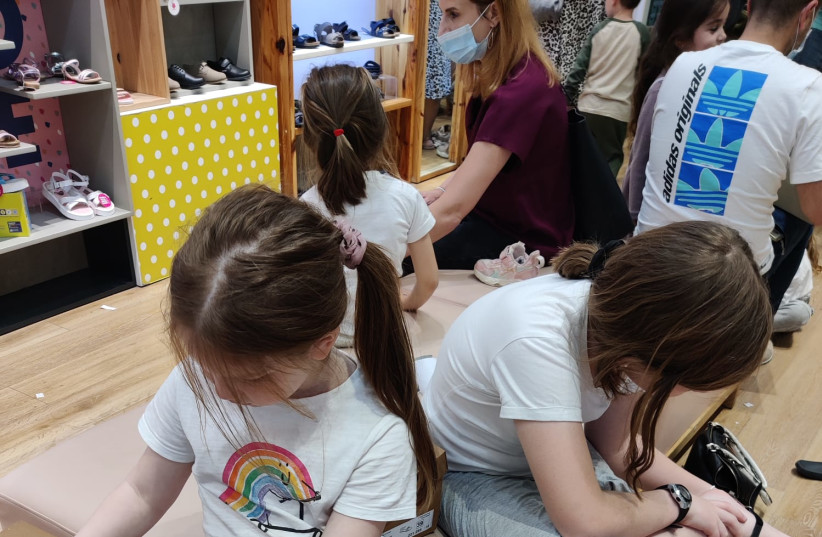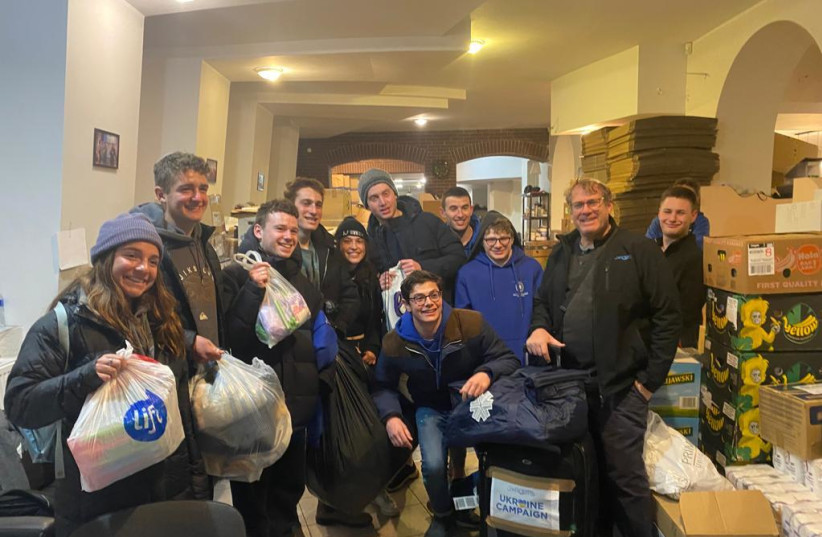Realizing that mothers of refugee families from Ukraine were busy looking after their children all day long, the organization JRoots partnered with the Galicia Jewish Museum in Krakow to turn it into a daycare center. Director Jakub Nowakowski makes sure teachers and psychologists are supervising, which gives mothers quiet time to figure out their next steps.
The daycare center in Krakow has organized outdoor trips for the children, including taking a group to a local restaurant for a workshop decorating biscuits. There was lots of blue and yellow icing – the colors of the Ukrainian flag.
“Each child from Ukraine is different,” said Valentyna Merzhyievska, coordinator of the JRoots & Galicia Jewish Museum Day Care for Ukrainian Children from Kyiv. “They come from various places: Kharkiv, Odesa, Lviv, Kyiv, the suburbs of Kyiv, villages from the area of Zhytomyr or Volhynia. They have different interests and levels of knowledge. They also have different memories of their prewar life. All of them were expelled from their places. Probably they would never meet if it wasn’t for war.”
Merzhyievska spoke about the different children.
“Vasylisa, a girl from a well-to-do family from Kharkiv, used to ride horses every week and had a few purebred dogs,” she said. “She spent vacation in foreign countries. Nothing is left of her home. She left with her family and only one dog.”

Another child is Svyatoslav, a boy from a small village near Zhytomyr, “the youngest son from a large family. He never had a pet. He had animals that he took care of on the farm. He never left his village – until now. Now they are all sitting together and playing bad people and superheroes – The superhero’s name is Zelensky.
“The children left because their houses were under fire. Sometimes the shelling lasted one night; sometimes weeks. Some of them don’t have a house anymore and have nowhere to return to.”
ALL OF the children are different, Merzhyievska said. In the safe environment of the day care center, some relax and calm down; others, who were subject to danger for a long time, need a lot of time and rehabilitation. Some crave attention, some are more aggressive than others, and some are apathetic and still don’t show any signs of emotions.

“Personally I feel very good in Krakow,” she said. “It is a beautiful city. It is a bit smaller than my native Kyiv, but it also has cozy cafés, delicious bread [and] spacious squares.
“I walk a lot, and I witness the beginning of spring, the appearance of the first leaves. All of this reminds me of my life in Kyiv before the war. On the day before February 24, we were discussing the necessity of removing old leaves from the lawn because primroses were to appear soon. But I had no time. And each time I see crocuses here, I think of the flowers that were to appear next to my home.”
JROOTS is a nonprofit based in Israel and the UK that has been organizing educational journeys to Poland and beyond for more than 15 years, and has taught hundreds of groups and thousands of people of all ages about the Holocaust.
Instinctively, upon hearing about the unfolding news in Ukraine, JRoots cofounder and director Tzvi Sperber felt he needed to put into practice everything he had been teaching and had learned from Holocaust history. He had the infrastructure in Poland and the contacts necessary to be able to help in a very real way.
Sperber immediately flew to Poland, and alongside the JRoots journeys has been working tirelessly around the clock to aid refugees and those trapped in Ukraine. He and Zak Jeffay from his JRoots team began mobilizing their Polish staff on the ground, and the JRoots campaign quickly gained traction.
JRoots has managed to set up a distribution center in Krakow; provide buses and transportation for refugees at the border wishing to come into Poland; pay for hundreds of beds in hotels; acquire buildings to house refugees; provide meals; backpacks for children; and shoe vouchers for refugees. It has also made huge deliveries of supplies into Kyiv and Lviv, including generators purchased and delivered from Berlin, medical supplies from around the world, and thousands of toys and games – all donated through its network.
Sperber’s phone does not stop, nor does he. As a Holocaust educator, he said there was no question about what to do.
“We practice what we preach,” Sperber said. “We talk about ‘Never Again,’ we ask questions regarding where the rest of the world was during the Holocaust, and we teach about the Righteous Among the Nations. JRoots couldn’t waste a moment.”
JRoots, a small nonprofit, has advised larger humanitarian organizations, sharing its knowledge and acting as a connector between institutions to ensure maximum impact and spread light in any way it can.
